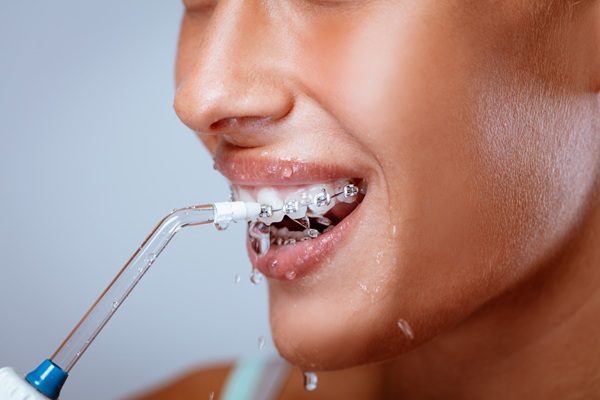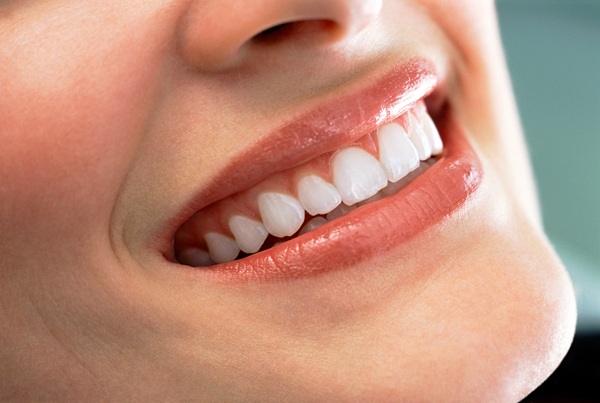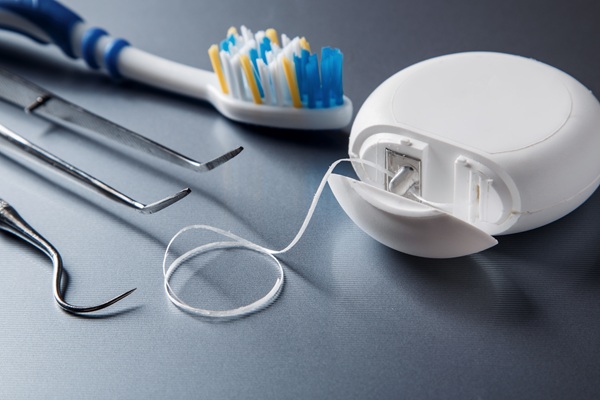When it comes to keeping your teeth and gums clean, brushing twice a day is only the first step.
Aside from regular brushing, flossing plays a big role in maintaining good dental hygiene, but many people find traditional string floss uncomfortable or hard to use. That’s where water flossers come in.
But you may be wondering: Are water flossers any good? Do they really help with dental hygiene, or are they just a fancy gadget?
Let’s walk you through everything you need to know about using a water flosser, including how it works, its benefits, and whether it’s a good option for you!
What Is a Water Flosser?
A water flosser—also known as an oral irrigator—is a handheld device that sprays a thin stream of water between your teeth and along your gum line. The water pressure helps remove food particles and plaque from areas that a toothbrush might miss.
It works by:
- Shooting water between teeth to loosen stuck food
- Flushing out bacteria from under the gums
Helping clean around dental work like crowns, implants, and braces
It may sound high-tech, but the goal is simple: to improve dental hygiene in a gentle and easy way.
Why Flossing Matters for Dental Hygiene
Before we dive deeper into water flossers, it helps to understand why flossing matters at all. Good dental hygiene isn’t just about having white teeth—it’s about keeping your whole mouth healthy.
When you skip flossing:
- Plaque builds up between your teeth
- Gums can become inflamed or bleed
- You increase your risk of gum disease (gingivitis or periodontitis)
- Tooth decay may happen in areas your brush can’t reach
Brushing cleans the surfaces of your teeth, but flossing tackles the tight spaces in between. That’s why dentists—like our team at Bellevue Hill Dental—recommend flossing once a day for good dental hygiene.
Are Water Flossers Any Good Compared to Traditional Floss?
If you find string floss hard to manage, a water flosser can be a great alternative. Many people prefer it because it feels gentler and is easier to use, especially if you have:
- Sensitive gums
- Braces or orthodontic appliances
- Crowns, bridges, or dental implants
- Limited hand movement or arthritis
In fact, studies have shown that water flossers can be just as effective as traditional floss—sometimes even more so when it comes to reducing gum bleeding and removing plaque.
Pros of Using a Water Flosser:
- Gentle on gums – Less likely to cause irritation or bleeding
- Easy to use – Great for people who struggle with manual floss
- Effective cleaning – Removes debris and bacteria from hard-to-reach areas
- Helpful for braces – Can clean around wires and brackets with ease
Cons to Consider:
- Needs electricity or batteries – Not as portable as floss
- Can be messy – Water may spray if not used properly
- Higher upfront cost – More expensive than traditional floss
Should You Use a Water Flosser?
If you’re consistent with regular flossing using string, that’s fantastic. But if you often skip it because it’s difficult or painful, then a water flosser might be the solution you need to maintain good dental hygiene.
You might especially benefit from a water flosser if:
- You have gum sensitivity or dental work
- You’re recovering from dental surgery
- You’re not flossing regularly with traditional methods
- You’re prone to plaque buildup or gum problems
For our patients,, we often suggest trying a water flosser if you’ve struggled with bleeding gums, inflamed pockets, or orthodontic appliances.
Tips for Using a Water Flosser Effectively
Just like brushing, technique matters when using a water flosser. Here’s how to get the most out of it:
- Start with warm water – It’s gentler on sensitive teeth and gums.
- Lean over the sink – This prevents water from spraying all over.
- Start on the lowest pressure setting – You can increase it as you get used to the sensation.
- Angle the tip along your gum line – Move tooth by tooth to ensure full coverage.
- Use daily – Just like brushing, consistency is key.
If you’re not sure whether a water flosser is suitable for you, ask your dentist during your next check-up. We can show you how to use it properly and recommend a model that suits your needs.
Maintaining Good Dental Hygiene at Home
While water flossers can support your oral care routine, they don’t replace other essentials. To maintain good dental hygiene, make sure you also:
- Brush twice a day with fluoride toothpaste
- Visit the dentist regularly for check-ups and cleaning
- Limit sugary and acidic foods
- Use mouthwash if recommended by your dentist
At Bellevue Hill Dental, we believe in making dental care simple, clear, and accessible for everyone. Whether it’s through traditional flossing or using new tools like a water flosser, the goal is always to protect your teeth and gums in the long run.
So, Are Water Flossers Any Good?
The short answer? Yes—water flossers are good for dental hygiene, especially if you struggle with traditional floss or have specific dental needs. They’re gentle, easy to use, and effective when used correctly and regularly.
Of course, everyone’s mouth is different. What works well for one person may not be right for another. That’s why it’s important to speak with your dentist about your flossing routine and find what works best for you.
Take the Next Step for Your Dental Health
If you’re curious about trying a water flosser or want advice on how to improve your daily dental routine, our friendly team at Bellevue Hill Dental is here to help.
Whether you’re dealing with bleeding gums, plaque build-up, or just want to keep your smile healthy, we can guide you in the right direction.
Book your dental appointment today and let us help you achieve better oral health—one clean tooth at a time!



